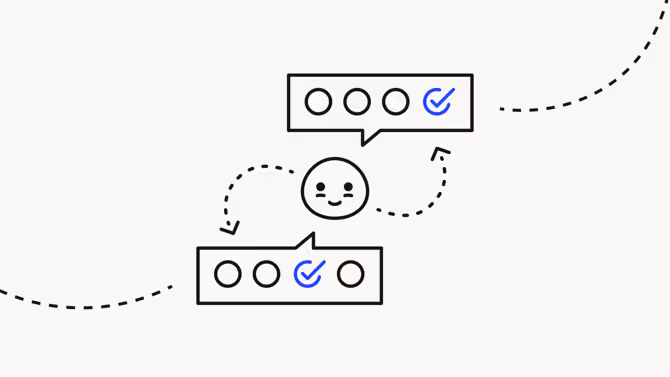Developing employee skills: a how-to guide

Empower your organization with the skills-based canvas.

Is your business growing well and you would like to delegate more tasks to your teams?
Would you like to make sure that your employees’ skills are aligned with your company’s future needs and your long-term vision?
Would you like to develop the skills of your most promising and ambitious employees?
Did you answer ‘yes’ to at least one of these questions? If so, you are at the right place!
We have just identified an essential element in business: developing employee skills.
It is a proactive learning strategy that builds on employees’ professional development ambitions to improve performance, in every sense of the term. In other words, you want to give your employees the best tools so they can thrive at work and grow in their careers.
As a manager, the main goal of skill development is to bring more value to your business and bring its growth to the next level.
How can you do that? By using your most precious resource: your employees, their workforce and their willingness to acquire new skills.
Would you like to find out more ?
Check out this guide on business skill development, which explains in detail what employee development consists of, how to set up such a strategy and what to avoid when doing so.
What exactly is skills development?
Skills development: Definition
Skills development is a learning process by which a company allows its employees to deepen their knowledge and improve their practice.
This approach addresses long-term needs and ambitions and is aligned with the employees’ careers.
What is the difference between employee training and skills development ?
The concepts of employee training and skills development are so intertwined that they are sometimes taken for one another. So let’s be specific!
The goal of employee training is to meet a specific need for a new skill or knowledge, in the short term, related to the position currently occupied by the employee.
On the other hand, skills development is a long-term process which aims to develop more general skills. Of course, these new skills can be put into practice quickly but the process pertains more to the long-term development of the employee’s professional career.
It can refer both to the know-how in an employee’s current field of expertise and the know-how needed for future positions that require more responsibility.
A human approach to reaching your goals
Skills development is human-oriented.
At Workleap LMS, we notice the same thing day after day: a company that achieved its organizational goals is a company that focuses on the human, because it represents its main strength.
Successful companies manage to make the most of their available skills. Above all, they involve their employees in the process, in order to truly understand their needs and support them effectively.
Why invest in skill development ?
When well executed, improving employees’ skills benefits everyone: the employees first of all, then the company. It is a lever that managers have every interest in using to improve performance both at team level and at company level.
When we talk about ‘performance’, we are not necessarily talking about dramatically increasing the number of contracts or company turnover. Rather, we focus on improving ourselves to become more efficient and productive, through better trained employees who are more fulfilled in their work.
The budget a company allocates to skills development is not just a ‘burden’ or an ‘expense’, it is a real long-term investment. Employees are the greatest wealth of a company. It is therefore natural to take care of it and maintain its value, and better yet, to improve it.
Skills development is therefore not a burden, but an investment that brings value to the company in the long run!
Who is responsible for skills development in business ?
This is a big question that we have tried to answer, and we advise you entrust the strategic vision of skills development to the operations managers, and its coordination and support to your human resources department.
Could we be forgetting a part of the equation? The most important part of it all are the employees themselves.
Remember: the career and professional development of your employees are at the heart of skills development.
And while operations management and human resources are responsible for this approach, the core rests with the employees, because they are its focus. It is up to the most motivated among them to make the best out of what the company is ready to offer them, in terms of skills and career path.
The 5 biggest benefits to developing your employees’ skills
Here are the main benefits a company can reap when implementing actions that aim to develop its employees’ skills.
1. Achieve long-term growth objectives
You probably have big dreams for your company: new products, new markets, new growth prospects… and that is normal, the human mind is always looking for more!
Improving your employees’ skills has a strategic dimension, but it also pertains to human resource management. They both go hand in hand.
In a company, learning and growth are intimately linked. And the challenge of skills development is to match the employees’ professional ambitions with the company’s organisational goals. It is a loop that benefits everyone, the employees and the company at large.
Some employees may be looking for new responsibilities, new professional challenges. Skills development makes it possible to meet their ambitions.
Among the many impacts you can expect for your business are :
- An improved customer service quality through soft skills development
- Organizational efficiency through your managers’ leadership development
- Innovation and new ideas through intrapreneurship development
2. Delegate more responsibilities
Why should you continue to entrust everything to team leaders when some employees are motivated to take on more responsibility?
This is where skills development comes into play: it helps you delegate responsibilities to employees who have all the motivation and potential needed.
By gradually delegating higher-level tasks, managers enable employees to develop new skills and prepare for further, higher responsibilities that the company needs to address in order to achieve its growth goals.
But remember that when it comes to skills development, there is a valuable human aspect to address: by delegating responsibilities you also improve trust between managers and employees, which is in itself a precious asset.
3. Improve performance
At Workleap LMS, we believe that ‘performance’ is not a ‘dirty word’.
When a company strives to achieve goals, they are referred to as ‘organizational goals’. Without properly trained employees, it is impossible to achieve them. Employees who are better supported and better equipped to manage projects will be more efficient, more comfortable in their role and their daily life.
For example, a company could have as an organizational goal to increase the average bill of their customers. By offering to develop the communication and persuasion skills of its sales team, the company will help them perform better and therefore increase their chances of success.
These skills can also be applied in other contexts, or even in a growth perspective (for example, becoming a department manager).
4. Increase motivation and commitment
Skills development is a corporate culture marker.
No employee likes the feeling of ‘stagnating’ in their position and not learning anything. Inversely, in a company that promotes continuous learning and advancement, employees evolve in a constructive working atmosphere.
All this contributes to the creation of the employer brand.
Employees’ motivation is higher when they feel they are progressing. Giving employees the opportunity to develop new skills or to improve their skills opens up the possibility to entrust them with new responsibilities.
According to TeamStage, motivated employees can contribute to:
- 21% increase in profitability
- 41% reduction in absence rates
- 87% less employees leaving the company
5. Improve employee retention and save money on hiring
This brings us to a very sensitive topic : employee retention.
Thanks to their new skills, employees can apply to other positions by benefiting from internal mobility. It becomes interesting to bet on employees who have potential and need a chance to prove it.
By implementing a skills development policy, you can improve your talent management and reduce talent drain, as well as save money on the hiring process.
We all know that it is easier and less costly to retain talent rather than look for new one! In the current context of labor shortage, all companies should consider this!
The good news is that all these benefits can accumulate their effects, provided you set up a good skills development strategy and aim for long-term results.
The best ways to develop your employees’ skills
How to develop employees ?
This is a question many business leaders ask. There are many different ways to develop your employees’ skills. You can even use several different methods together!
Identify relevant skills
‘Skills development’ is a hot topic, but which skills are we talking about exactly?
It is a fact that skills are different from one company to another, and from one employee to another. Any manager who engages in an effort to improve their employee skills must first complete a skills gap analysis.
The goal: identify the critical skills that need to be developed, and which your company needs in the short, medium and long term to achieve its objectives; next, compare them with the actual skills of your teams.
This is the first step, but there is still work to be done to compare the skills the company needs to the career ambitions of your employees.
Rely on your employees’ career goals and wishes
How can you know what your employees wish for in their careers, if you don’t ask them about it?
It is impossible. That is why managers and employees must set up meetings and exchange periods to help employees identify their professional goals and create individual development plans that will define:
- The challenges that employees face in their missions and the challenges they want to take up in their career
- The means for employees to achieve their goals and meet their challenges
- The time required to achieve the goals you have identified
Take time during one-on-one meetings or annual assessments to ask these questions!
It is one way to motivate employees and make sure the company’s goals are in line with those of its employees.
Implement individual skill development plans
After completing the skills gap analysis and collecting your employees’ expectations, you now know:
- Which skills need to be developed
- Which ones are a priority
- How many employees are concerned by your findings
- Who your most ambitious employees are, in terms of career
- etc.
You can then develop individual skills development plans.
But concretely, how do you set this up?
There are many different ways to develop your employees’ skills, formally or informally. Both types of learning have their advantages but the big advantage of formal learning via a training platform is that you get to create a structured framework that allows each employee to achieve the set goals.
Create an enabling environment: break down barriers and keep employees motivated
If you have read this far, it's because you have a great motivation to succeed in your skills development process. The last point we would like to emphasize is creating a favorable environment for the success of your project.
Your plan will not work in a company whose departments and teams work in silos, within a rigid structure. You must first ensure that cross-functional collaboration is possible, that exchanges are fluid and that the corporate culture is conducive to sharing and employee development, at all levels.
By eliminating work silos you can enable employees to explore new, more challenging areas and strengthen their skills.
Finally, you must communicate with your employees throughout the process, in order to give them feedback, identify elements that need improvement, and recognize success. Motivating your teams is a daily challenge!
You are wondering why we are talking about breaking down the barriers that may be in your way? To prevent you from running into traps or pitfalls.
What pitfalls to avoid ?
As previously seen, skills development is a strategic move for your company and for your employees’ well-being. How do you make this strategy pay off?
Other managers have done it before you, and we have compiled all the mistakes and behaviors to avoid.
Lack of exchange with employees
Learning new information, regardless of your position and age is a very profitable step, but it requires putting yourself in an open, welcoming position. Not all employees are ready to take this step.
So how do you go about it? By listening to what employees have to say about their careers and professional development. After all, they are in the best position to talk about their ambitions.
In other words, setting up a top-down approach is far from being the best idea.
Setting up a skills development strategy must start from the people who are the most concerned by it: your employees. You must therefore take the time to exchange with each member of the team regularly.
Lack of communication about the company’s long-term vision
We cannot repeat it enough: communication within a company is essential. It allows everyone to know what they have to do, and how to improve, if needed.
For your skills development strategy to work, you must give employees all the information they will need to achieve your organizational goals.
It is the responsibility of the team leaders to think about explaining the ‘why’ behind your actions and the potential long-term challenges.
Fortunately, technology makes it possible to get everyone on the same page and offer them the same level of information. For example, a knowledge management system can store all the information in one place and make it accessible to all members of a company.
Lack of involvement on behalf of the managers
Within this challenge, the role of managers and team leaders is crucial. Everyone has a role to play and employees cannot handle everything, no matter how motivated they are. We should remember to maintain motivation and stimulate a culture of learning.
On the other hand, the role of managers is to encourage the development of their teams by driving the process themselves. How can an employee develop if their manager does not encourage them to do so and does not seek to continuously learn themselves? It is crucial to show employees that a skills development approach is an integral part of your corporate culture, and that it applies to all levels of your organization.
It is time for managers to put their leadership into practice, because leadership is an essential business skill!
Lack of time
In order for it to be a profitable and pleasant experience, the skills development approach should not be seen as an additional burden or extra work that you add to your already busy schedule.
At Workleap LMS, we often say that ‘Developing new skills takes time’.
Managers must therefore give employees the time they need to learn and practice their new skills. Practically speaking, this means that each employee must be able to reserve time for training within their schedule, even if it means encroaching a little on the time normally dedicated to productivity.
Lack of evaluation of the approach
Skills development is a long-term approach, but how can you evaluate its results?
No one likes to work in vain, of course.
You must define measurable performance indicators from the start. They will allow you to see if a strategy is effective or not, and to identify the elements that need improvement. There is also a need for regular re-analysis of the skills gap.
How can an LMS help track skills development?
‘What tools could help us develop our employees’ skills?’ Thi is a question we get asked a lot, at Workleap LMS, and our answer is a three-letter one: LMS.
What is an LMS?
You may not be familiar with the term ‘LMS’, so let’s start from the beginning. An LMS is a Learning management system. It is simply a private training platform that is specific to a company.
At the company level, using an LMS optimizes time use. Once the training is created, there is no need to start all over again. You can access it infinitely, reuse it, enhance it, and more.
On the employee level, the use of such a tool promotes autonomy, because an LMS allows them to learn at their own pace, in time slots of their choosing.
Beyond these advantages, there is an essential point that interests us: the follow-up process of your employees’ skill development. In our opinion, there are several great advantages to using an LMS to do this follow-up.
Create customized courses and training adapted to each professional path
By using an online training platform, a company can create different content depending on the skill needs and areas of expertise, the type of position or department of the employees being trained. Each employee can follow all or part of the modules, according to what has been defined with their team leader, based on their professional ambitions.
Yes, skills development places people and employees at the heart of the equation.
Employees displaying the most potential and ability to develop new skills can therefore progress more quickly, while those who need more time can do so at their own pace.
An LMS allows you to track employee progression in real time, in an individualized and personalized manner.
Track and measure employee progress
Everyone needs reliable data.
An LMS centralizes data and information. It is a tool that allows you to track the progress of each employee and generate reports. On the other hand, managers can have access to the individual progress of each employee, see the modules they are following and the scores they get. This provides indicators.
In summary, using an LMS helps to ensure that skills development fulfills its functions: to match the company’s goals with the professional ambitions of its employees, based on objective indicators.
Adjust your skills development strategy
By analyzing this information, it is possible that the company decides to modify certain elements and adjust its strategy and actions: it could choose to develop new modules, prioritize certain specific skills, etc.
For example, an LMS allows you to organize training according to different groups, to define its order and number of steps. Everything is modular and customizable, nothing is fixed!
Build a common knowledge and skills base across the company
Is your goal to get the most employees on board and involved in the growth of your business?
If it is, you will find using an LMS very helpful. It will become a reference tool for monitoring the skills development and will serve as a centralized knowledge database from which your employees can draw at any time.
You can use it to document internal expertise and work on continuous skills development!
It’s your turn!
As we have seen, skills development can be one of the biggest challenges for companies, but it is also an excellent lever that can propel your business and employees.
%20(1).png)

%20(1).avif)


.avif)
.avif)








